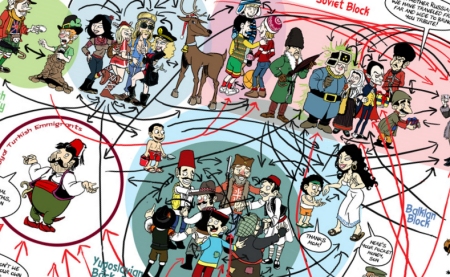Understanding Eurovision Song Contest Voting: A Complete Guide

Table of Contents
The Two-Stage Voting System
The Eurovision Song Contest utilizes a two-stage voting system, ensuring a blend of professional judgment and public opinion. This dual approach aims for a balanced reflection of both critical appraisal and popular appeal. The two phases are: professional juries and televoting.
-
Professional Juries: Each participating country has a professional jury consisting of five music industry experts. These juries are carefully selected to prevent bias and ensure a diverse range of musical perspectives. They score each performance anonymously, based on criteria such as vocal ability, musical composition, performance, and overall stage presentation. The jury scores are kept secret until the live broadcast to maintain suspense and impartiality.
-
Televoting: This crucial aspect allows viewers across Europe and beyond to have their say. The public votes via telephone, SMS text message, or dedicated apps. While the general principle is consistent, specific methods and availability of voting options can vary slightly from country to country. For example, some countries might have dedicated Eurovision voting apps, while others may rely more heavily on traditional telephone voting. The sheer volume of votes from televoting makes it a powerful force shaping the final results.
-
Equal Weighting: Crucially, both the jury and televote scores carry equal weight in determining the final ranking. This ensures a fair balance between expert opinion and popular choice, creating a robust and representative outcome.
Understanding the Points Allocation
Once all the votes are tallied, the points are allocated in a dramatic reveal. This process is designed to build suspense and excitement.
-
Points Allocation: Each country awards points to its top ten favorite entries. The top three receive 12, 10, and 8 points respectively, then descending in increments of one point down to 1 point for 10th place. This structured point allocation system ensures that the top performers are clearly rewarded.
-
Zero Points: It's not uncommon for some countries to receive zero points ("nul points"). This can be due to a variety of factors, including the specific musical preferences of viewers and juries in that year, and doesn't necessarily reflect poorly on the song itself. Receiving zero points can add to the narrative of the contest, sometimes leading to surprising upsets or unexpected outcomes. For instance, "Country X gave 12 points to Country Y," highlighting the diverse tastes and preferences at play in the competition.
-
The Significance of Nul Points: The awarding (or lack thereof) of "nul points" can create dramatic moments during the broadcast and become a significant talking point afterward. It often reflects the highly subjective nature of musical taste and the unpredictability of the Eurovision Song Contest.
The Role of the Spokespersons
A vital element of the voting process is the announcement of points by national spokespersons. Their role adds another layer of anticipation and excitement.
-
Spokesperson Selection: Each country selects a spokesperson, often a well-known personality from their entertainment industry. The choice is usually made to maximize the country's visibility during the broadcast.
-
Generating Excitement: The spokespersons deliver their country's votes, building suspense with dramatic pauses and emphatic pronouncements of points awarded. This live announcement is a key part of the viewing experience, transforming a simple number into a memorable moment.
-
Memorable Spokespersons: Over the years, some spokespersons have become renowned for their unique style and charisma, leaving a lasting impression on viewers. These moments, from humorous to heartfelt, contribute to the overall atmosphere and memorability of the Eurovision Song Contest.
Controversy and Debate Surrounding Eurovision Song Contest Voting
Like any major international competition, the Eurovision Song Contest voting system has faced its share of criticism and debate.
-
Bloc Voting: The phenomenon of "bloc voting," where neighboring countries or countries with strong cultural ties tend to vote for each other, is often cited as a point of contention. This can lead to accusations of bias and unfairness, suggesting that musical merit alone does not always determine the outcome.
-
Neighbouring Country Bias: Geographical proximity undeniably influences voting patterns, as countries often share cultural affinities and broadcast media overlaps. This can create a sense of regional voting blocs, sometimes impacting the overall balance of power.
-
Political Implications: While the Eurovision Song Contest aims to be purely a celebration of music, political factors have occasionally been suggested as influencing voting patterns. This is often a subject of speculation and debate, without conclusive evidence.
-
Fairness and Transparency: The ongoing debate surrounding the fairness and transparency of the voting system is a testament to its significance and the high stakes involved. Ensuring a system that is both engaging for viewers and perceived as impartial is crucial for the future of the competition.
Addressing Common Questions about Eurovision Song Contest Voting
-
Can a country vote for itself? No, a country cannot vote for its own entry. This eliminates any potential conflict of interest or self-promotion.
-
What happens in case of a tie? In the event of a tie, the rules stipulate specific tie-breaking procedures. This usually involves looking at the jury scores and then to televoting to resolve the ties. The specific rules can be slightly different depending on what stage of voting it occurs.
-
How are the results verified? Independent auditors verify the voting results to ensure transparency and integrity. This process is crucial to maintain the credibility of the competition and address any concerns about potential manipulation.
Conclusion
Understanding the intricacies of Eurovision Song Contest voting is essential to fully appreciating this global phenomenon. From the dual voting system encompassing juries and televoting to the dramatic point allocation and the occasional controversies, the voting process is integral to the competition's outcome. By grasping the various elements explored in this guide, you'll be better prepared to follow along and fully immerse yourself in the thrill of the Eurovision Song Contest. So, deepen your understanding of Eurovision Song Contest voting and get ready for the next spectacular event!

Featured Posts
-
 Fallece Juan Aguilera Leyenda Espanola Del Tenis
May 19, 2025
Fallece Juan Aguilera Leyenda Espanola Del Tenis
May 19, 2025 -
 Grammy Nominees Farewell Final Show Set For May After 5 Decades
May 19, 2025
Grammy Nominees Farewell Final Show Set For May After 5 Decades
May 19, 2025 -
 Finalister Och Startordning Melodifestivalen 2025
May 19, 2025
Finalister Och Startordning Melodifestivalen 2025
May 19, 2025 -
 Huge Raves Economic Impact A Positive Review
May 19, 2025
Huge Raves Economic Impact A Positive Review
May 19, 2025 -
 Investissement Immobilier Poitiers 46 Appartements Dans Batiments Historiques Rehabilites
May 19, 2025
Investissement Immobilier Poitiers 46 Appartements Dans Batiments Historiques Rehabilites
May 19, 2025
